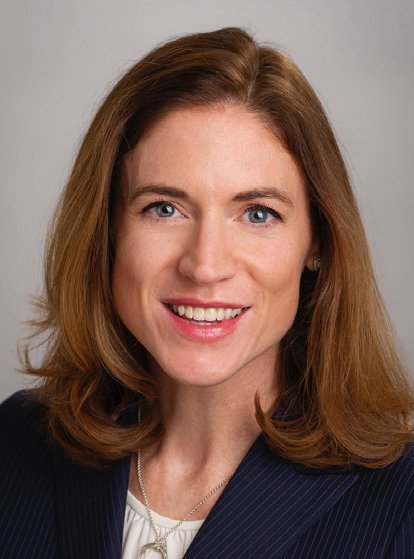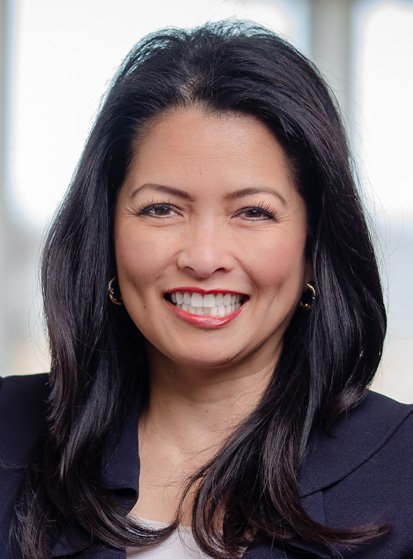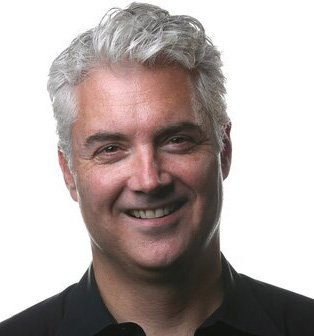
Health care executives draw on their Jesuit educations to manage large staffs and put patients first
By Michael Austin
Nancy Paridy could have sheltered in her office while COVID-19 raged through public spaces in 2020. As president and chief administrative officer of Shirley Ryan AbilityLab in Chicago, she could have led from a safe distance. But her Jesuit training wouldn’t allow her to hide away.
“One of my guiding principles is that I should not expect anyone to do something I won’t do,” says Paridy, an attorney who earned her LLM in Health Law from Loyola University Chicago School of Law and has sat on the Loyola Academy board since 2016. “As a hospital administrator, at the height of the pandemic, I felt it was critical for me to be present on the floors of the hospital. If staff were expected to be giving care, I needed to meet their commitment by being present and supportive.”
Paridy is one of the many Jesuit-educated executives who manage health care facilities or organizations across the Midwest, a role they say dovetails naturally with Jesuit principles.
“I am grateful to work in a profession that so closely connects to my value system,” says Meghan Clune Woltman, SVP, chief government affairs Officer for Advocate Health, which serves patients in Georgia, Illinois, North Carolina, South Carolina and Wisconsin. “Men and women for others is absolutely at the core of the health care industry.”
A double-graduate of Saint Louis University (bachelor’s in communication and marketing, master’s in communication, studying political rhetoric and journalism), Woltman grew up near Kansas City, the third of five children. Her grandfather, father, mother and three siblings attended Rockhurst University. Her father and several uncles also went to Rockhurst High School.
“The joke in my family was, my parents would let us go to any college we wanted,” Woltman says. “As long as it was Jesuit.”
At SLU she learned lessons that she still applies to work today. “The Ignatian values of authenticity, integrity and courage have shaped my approach to leading my team, collaborating with colleagues and establishing partnerships outside my organization,” she says.
It was Creighton University that influenced how Dr. Nick Turkal, MD (pictured above), approaches his role as chief executive officer of the Center for Health Education and Access. Working with partner schools in New Mexico and Idaho, the Center helps create physicians for long-term assignments in rural and urban underserved communities. “My undergrad education helped me understand who I wanted to be as an adult,” Turkal says. “While I was a biology major, the other courses I took—theology, philosophy, history—were equally important, as they shaped my ethics about life. What I found, with the Jesuits and other faculty, who all carried the same values, was that I wanted to be someone who made a difference in the world.”
He went on to Creighton University School of Medicine and maintained a clinical practice even as CEO of Advocate Aurora Health Care. After retiring, he stepped into his current role and returned to the bedside as a hospice physician.
“It’s just a different way of using skills and morals,” he says.
Josie Abboud, the president and CEO of Methodist Hospital and Methodist Women’s Hospital, serves on the boards of both Creighton University and Creighton Preparatory School. She earned her bachelor’s in nursing at Creighton and her master’s in business administration and health care management at Regis University in Denver. Her work history, including 27 years at Methodist, has served her well.
“I believe since I started out on the patient side there’s a certain amount of ‘street credibility’ for having been in the trenches,” she says. “The experience I’ve had has played an integral role in how I’ve developed on the administrative side.” Abboud’s Jesuit education taught her
that success will follow if she and her colleagues stay focused on patients, keep their minds open, lift others up, teach, learn and comprehend the power of prayer.
“It’s imperative that I listen, to understand what’s happening on the frontlines of the organization,” she says. “However, in health care, things change quickly and we learn new things every single day. It’s not possible for me to know everything, and the Jesuits also teach humbleness and humility. I am grateful for that.”
Dr. Jay Shannon, MD, has a similar background, beginning as a staff physician at Cook County Hospital and rising to chief executive officer of Cook County Health. The Jesuits at Spring Hill College in Mobile, Ala., shaped his decision to serve the most vulnerable populations of society, work he continues today as a principal at Health Management Associates.
“There was more attraction for me to go to places where the patient didn’t necessarily have the same opportunities as some other people,” Shannon says. “Being able to take that same level of clinical expertise and apply it to people who seemingly get the short end of the stick in every other aspect of their life was far more rewarding for me personally.”
MY UNDERGRAD EDUCATION HELPED ME UNDERSTAND WHO I WANTED TO BE AS AN ADULT.
Moving from patient care to administration took some discernment. “I was drawn to leadership,” he says. “But there’s a reluctance because you get pulled away from the care of the individual person. The question became ‘How do organizations care for individual people and get them the best care possible?’ The notion of men and women for others comes through subtly. I feel like that’s had a significant impact on my life choices as I’ve grown as a person and a professional.”
Midwestern Jesuit universities, from Xavier to Marquette and Loyola University Chicago to the University of Detroit Mercy, offer dozens of health care programs and degrees. In the fall of 2023, John Carroll University will offer its first bachelor’s of science in nursing.
The Creighton University School of Medicine also recently opened its Phoenix Health Sciences Campus in Arizona, becoming the only Jesuit medical school in the western United States. As an undergraduate at the University of Wisconsin-Madison,
Christina Zorn thought she’d become a doctor. But a change of heart led her to Creighton University School of Law. In 2002, after close to four years of work at a Milwaukee law firm, she joined Mayo Clinic as legal counsel. She worked in several administrative roles over two decades—chair of the legal division, chief administrative officer of Mayo Clinic in Florida—and in December of 2021, Mayo Clinic named her chief administrative officer in Rochester, Minnesota. She works extra hard to bridge the gap between the administrative side and the patient side. “When I’m in a room full of nurses talking about novel treatments, there’s no way I’m going to know more than they do,” says Zorn, whose Jesuit-educated father taught at Marquette University Law School. “But I can do my homework and bring something to the discussion that they cannot. As long as I’m working harder than anyone else, I can contribute in positive ways. And that is absolutely a Jesuit principle, striving for excellence in the work you do, and doing it wholeheartedly and with full intent.”








